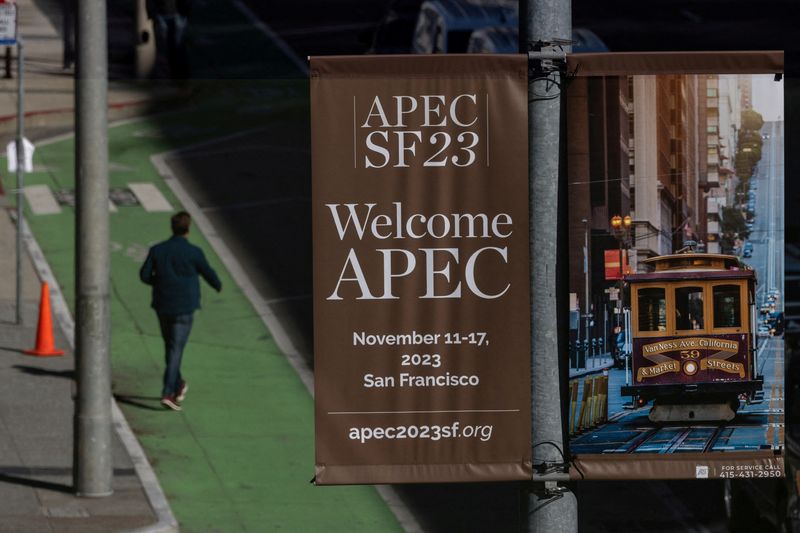[ad_1]

© Reuters. FILE PHOTO: An indication promoting the upcoming APEC (Asia-Pacific Financial Cooperation) Summit in see as the town prepares to host leaders from the Asia-Pacific area in San Francisco, California November 8, 2023. REUTERS/Carlos Barria/File Photograph
By David Lawder
SAN FRANCISCO (Reuters) – The Biden administration is aiming to point out that its key Asian financial initiative is making progress as Pacific Rim leaders collect in San Francisco subsequent week, however important holes stay on trade-related chapters, individuals acquainted with the talks say.
Negotiators from 14 nations are racing to shut out chapters of the Indo-Pacific Financial Framework for Prosperity in unexpectedly organized talks this week, with bulletins anticipated on cooperation to speed up the clear power transition and to battle corruption and tax evasion.
U.S. President Joe Biden is eager to painting IPEF as producing significant outcomes to leaders of Asia Pacific Financial Cooperation nations, as he seeks to supply them a U.S.-led different to deeper financial ties to China.
When the administration launched the IPEF negotiations in 2023, it made clear that the U.S.-hosted APEC summit was a key deadline, “and that has raised expectations,” mentioned Wendy Cutler, a former U.S. commerce negotiator who now heads the Asia Society Coverage Middle in Washington.
“The significance of that is to point out that the U.S. is stepping up, by way of APEC and IPEF, to say ‘we’re again in Asia and we will stay a detailed financial companion,'” Cutler mentioned.
NOT TPP
The Trump administration deserted the 12-country Trans-Pacific Partnership (TPP) free commerce deal in 2017, however IPEF is much extra restricted in scope, foregoing conventional tariff reductions and different market entry enhancements. As an alternative it promised cooperation on provide chains and clear power together with larger requirements for labor, surroundings and regulatory practices and digital commerce.
Nations collaborating in IPEF are Australia, Brunei, Fiji, India, Indonesia, Japan, South Korea, Malaysia, New Zealand, the Philippines, Singapore, Thailand, Vietnam and america. All however India and Fiji are additionally members of APEC.
Solely one of many 4 IPEF “pillars,” on strengthening provide chains, has a accomplished textual content, with offers reached in Might on an early warning system for potential provide disruptions like these seen after the pandemic, in addition to a council to seek the advice of on provide chain points corresponding to these involving nationwide safety or important financial sectors.
Folks acquainted with the talks say that two different pillars led by the Commerce Division are prone to attain substantial conclusion within the subsequent week with bulletins on boosting cooperation on de-carbonization efforts and to fight corruption and tax evasion.
DIGITAL SHIFT
The commerce pillar has confirmed harder, with many nations not prepared to satisfy U.S. calls for to satisfy sure labor and environmental requirements or needing extra time to think about them, three individuals acquainted with the talks mentioned.
Negotiations on digital commerce requirements — as soon as seen as a marquee function of the IPEF commerce pillar — are largely frozen because the Biden administration has suspended discussions on key guidelines after reversing longstanding U.S. positions on e-commerce.
The U.S. Commerce Consultant’s workplace final month dropped its insistence on guidelines to guard free cross-border knowledge flows and to ban nationwide necessities for knowledge localization and opinions of software program supply code, arguing that the change was wanted to provide Congress room to enact stronger laws on massive expertise companies. The transfer has happy liberal democrats who need to rein in Massive Tech however angered many enterprise teams.
“It is powerful. By adopting these fringe views on digital commerce, USTR actually brings the principle substance on digital commerce to a halt,” mentioned John Murphy, senior vice chairman for worldwide coverage for the U.S. Chamber of Commerce.
However the Biden administration stays decided to announce some agreements on the commerce pillar, with the probably offers seen within the space of commerce facilitation measures, such adoption of digital customs kinds and digital signature requirements.
One of many sources acquainted with the talks mentioned that early enthusiasm on the IPEF commerce pillar — which excludes India — has given solution to frustration over the problem and complexity of points concerned.
“Commerce negotiations take a very long time, even whenever you’re providing market entry,” mentioned Cutler, who was USTR’s lead negotiator on TPP a decade in the past. “However whenever you’re not providing market entry, the onus is extra on the demander — on this case, america — to point out these different nations that there are advantages.”
[ad_2]
Source link





